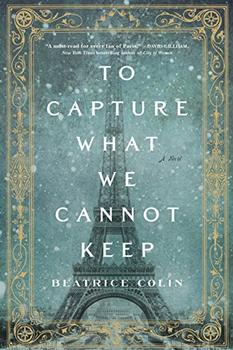Summary | Excerpt | Reviews | Beyond the book | Read-Alikes | Genres & Themes | Author Bio

The Coral Thief, as riveting and beautifully rendered as Ghostwalk, Rebecca Stott’s first novel, is a provocative and tantalizing mix of history, philosophy, and suspense. It conjures up vividly both the feats of Napoleon and the accomplishments of those working without fame or glory to change our ideas of who we are and the world in which we live.
Paris, 1815. Napoleon has just surrendered at Waterloo and is on his way to the island of St. Helena to begin his exile. Meanwhile, Daniel Connor, a young medical student from Edinburgh, has just arrived in Paris to study anatomy at the Jardin des Plantes - only to realize that his letters of introduction and a gift of precious coral specimens, on which his tenure with the legendary Dr. Cuvier depends, have been stolen by the beautiful woman with whom he shared a stagecoach.
In the fervor and tumult of post revolutionary Paris, nothing is quite as it seems. In trying to recover his lost valuables, Daniel discovers that his beautiful adversary is in fact a philosopher-thief who lives in a shadowy world of outlaws and émigrés. Daniel's fall into this underworld is also a flight, for as he falls in love with the mysterious coral thief and she draws him into an audacious plot that will leave him with a future very different from the one he has envisioned for himself, Daniel discovers a radical theory of evolution and mutability that irrevocably changes his conception of the world in which he lives.
An epic tale of change, love, and science set against the backdrop of post-Revolutionary France... Overlaid on top of the excellently executed historical fiction is a page-turning mystery that will keep readers riveted... The narrative ranges from delightful scenes at the Jardin des Plantes, the epicenter of naturalist research, to the twisted, dark alleys of the poorer sections of Paris, and each moment transports the reader to a bygone era...continued
Full Review
(800 words)
This review is available to non-members for a limited time. For full access,
become a member today.
(Reviewed by Sarah Sacha Dollacker).
 The Jardin
des Plantes in Paris was the epicenter of naturalist research in the early 1800s and is currently one of the world's foremost botanical gardens. Built in 1626,
it was planted in 1635 as a medicinal herb garden for the King of France. It
was opened to the public in 1640, greatly expanded under superintendent G.L.L
Buffon, and eventually developed into a center of scientific study. Georges
Cuvier, Jean-Baptiste Lamarck, the Jussieu brothers, and other prominent scientists
of the time were all associated with the Jardin des Plantes and conducted research
there. During the early 19th century, the facility supported expeditions to
different parts of the world to acquire large numbers of plants and animals
...
The Jardin
des Plantes in Paris was the epicenter of naturalist research in the early 1800s and is currently one of the world's foremost botanical gardens. Built in 1626,
it was planted in 1635 as a medicinal herb garden for the King of France. It
was opened to the public in 1640, greatly expanded under superintendent G.L.L
Buffon, and eventually developed into a center of scientific study. Georges
Cuvier, Jean-Baptiste Lamarck, the Jussieu brothers, and other prominent scientists
of the time were all associated with the Jardin des Plantes and conducted research
there. During the early 19th century, the facility supported expeditions to
different parts of the world to acquire large numbers of plants and animals
...
This "beyond the book" feature is available to non-members for a limited time. Join today for full access.

If you liked The Coral Thief, try these:

To Capture What We Cannot Keep
by Beatrice Colin
Published 2017
Set against the construction of the Eiffel Tower, this novel charts the relationship between a young Scottish widow and a French engineer who, despite constraints of class and wealth, fall in love.

by Michael Gregorio
Published 2011
Dark, intelligent, and vividly written, A Visible Darkness continues a masterful series of historical mysteries that portray a past torn between nationalism and humanism, superstition and science.